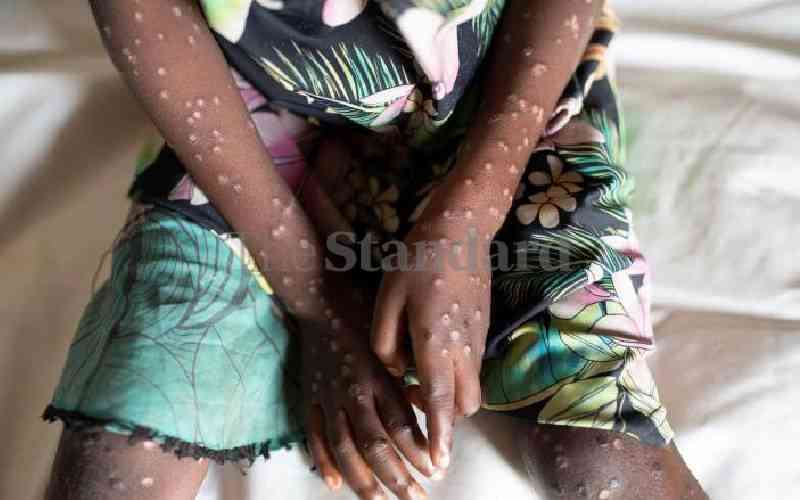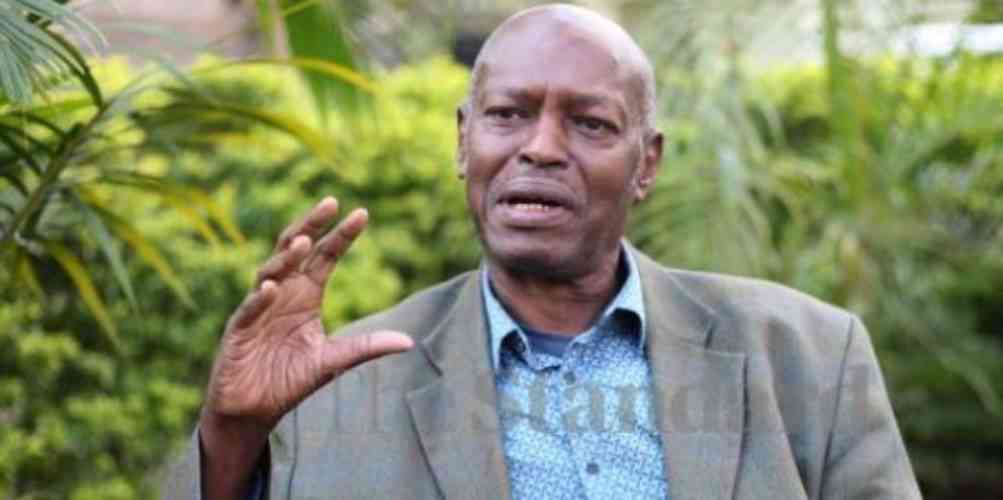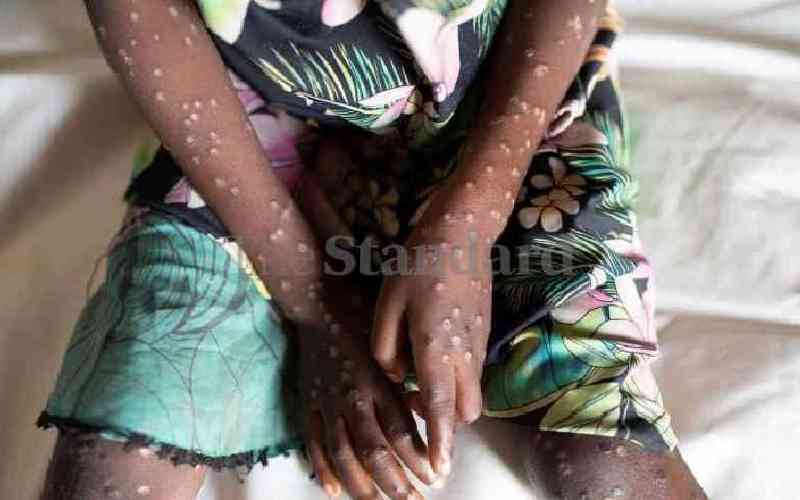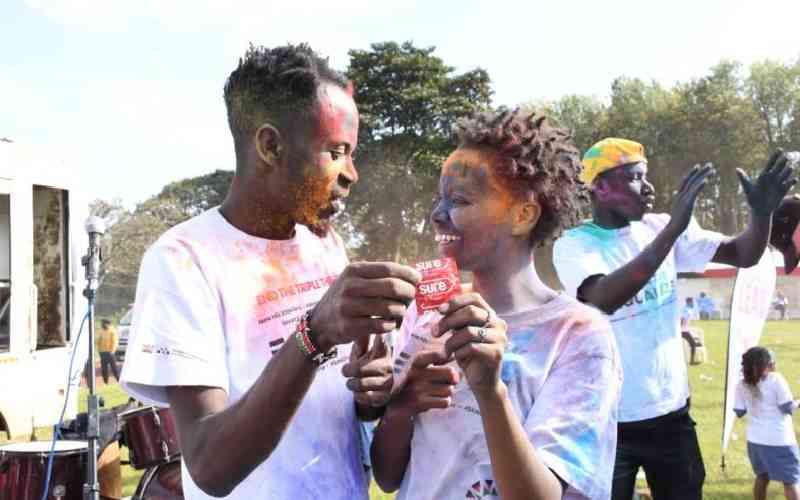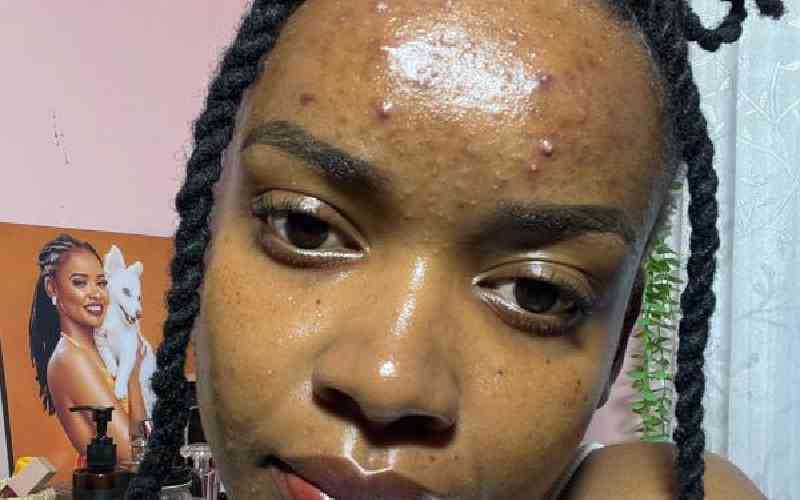
What started as a small spot on her forehead one morning when she was 16 years old and in Form Two, was later to become a face full of pimples.
Now 24, Lynette Wambui, a content creator and an undergraduate student at Maasai Mara University, is bravely raising awareness about acne, a common skin condition caused by blocked skin pores.
“I can’t explain what changed when I was in Form Two. I just woke up one day and my skin looked and felt different. Still in the puberty zone, I thought it was just one of the signs of adolescence that would later disappear,” Lynette says.
She narrates that the pimple soon grew into a colony of them. And just as they had appeared suddenly, a few months later, they disappeared.
“I concluded that it was indeed adolescence stage without knowing with acne it fluctuates -- sometimes you have a clear face and other times, your face is occupied by numberless pimples,” Lynette says.
The trend continued throughout high school and after. As she got into her 20s, she started to realise that it had nothing to do with her age.
“My friends became worried about me. At some point, it felt that I didn’t own my face. Everyone offered a solution,” Lynette says.
“Eventually, I consulted a dermatologist who told her she had comedonal acne (clogged pores) which is considered non-inflammatory meaning the skin isn’t inflamed, “ she adds.
According to the National Institute of Arthritis and Musculoskeletal and Skin Disease (NIAMS), acne is a common condition that happens when the hair follicle under the skin becomes clogged.
Sebum is an oil that is naturally produced by the skin to keep it from drying out. This oil mixes with dead skin cells to plug the pores, leading to outbreaks of lesions commonly known as pimples. Outbreaks of pimples mostly occur on the face, but they can also appear on the chest, shoulders and chest.
“One of the most common forms of acne is comedonal acne, characterised by flesh-coloured bumps that commonly form on the forehead and chin when excess sebum clogs the pores and hair follicles,” says Dr Michele Green, a board-certified dermatologist in the United States.
“There are several types of comedones that patients may experience during a breakout; closed comedones -- also known as whiteheads -- open comedones also known as blackheads, micro comedones, macrocomedones, and giant comedones,” Dr Green explains.
According to the American Academy of Dermatology Association (AAD), hormones may explain why acne is so common in teenagers. During poverty, hormones called androgens increase the size of the skin’s oil glands and these glands start to make more oil which can clog pores.
When you have acne, you can develop any (or a combination) of these breakouts on your skin; Whiteheads, Blackheads, Pimples, Nodules, cysts, or both (deep and painful) this is according to AAD.
“People of all races and ages get acne, but it is most common in teens and young adults. When acne appears during the teenage years, it is more common in males. Acne can continue into adulthood, and when it does, it is more common in women,” explains NIAMS.
According to NIAMS, an increase in androgens, which are male sex hormones, may lead to acne. These increase in both boys and girls normally during puberty and cause the sebaceous glands to enlarge and make more sebum.
“Hormonal changes related to pregnancy can also cause acne. Researchers believe that you may be more likely to get acne if your parents had acne. Certain medications, such as medications that contain hormones, corticosteroids, and lithium, can cause acne. People of all ages can get acne, but it is more common in teens,” NIAMS states on their website.
Lynette narrates that the dermatologist did some analysis on her skin and finally prescribed drugs which he promised would work and her face would be ‘bright and sharp’.
“When I started the treatment, the people around me kept asking me why my skin looked like that. I tried to avoid these conversations to preserve my self-esteem,” she says.
Lynette recalls that her treatment experience was filled with ups and downs.
“Starting from expensive drugs -- after a single consultation costing Sh5,000, the doctor prescribed drugs amounting to over Sh10,000. In a month, you are supposed to go 1- 2 sessions or more depending on the severity of your acne,” she says.
“On top of that, I was not told the side effects. The first was depression. Also, when you take these drugs, the pimples increase in number (and that’s how it’s supposed to be when drugs are working but I didn’t know). I started to ask myself why I was even seeing the dermatologist,” Lynette recalls.
She says that, in addition, she experienced dry lips which was very intense. She would visit the dermatologist now and again, asking him why she was going through these side effects but he told her to be patient as that was all part of the treatment.
According to Lynette, side effects can take a toll on patients so one should do their research and get the facts from a dermatologist.
“So many people give up on treatment. You end up thinking the dermatologist is scamming you,” Lynette warns. “If you have acne whichever type it is, always do your research and ask questions but trust the process as getting clear skin takes time. I cannot say I have fully recovered but, for now, I have accepted that I have acne and I’m managing it better than before,” Lynette says.
“Living with acne can cause depression and low self-esteem. Free interaction with people will be non-existent because, at the back of your mind, you’re always wondering, ‘How people will judge me when they see my face?’ “
Now, Lynette says she has learnt to be confident and she no longer lets her skin condition put her down.
“When I’m out in public, some people will come up to me and say my face looks like a chapati. Others ask me why I haven’t consulted a dermatologist or tell me to scrub visible pimples as if I don’t know they exist,” Lynette says.
“I’m a content creator both in TikTok and YouTube and when I post photos or videos and go through the comments, I come across negative comments. But they no longer put me down. I’m optimistic that tomorrow I’ll recover and have a clear face,” she says.
Lynette is using her TikTok and YouTube platforms to educate the public about acne. She says it’s not a disease but just a little skin problem that, if managed by a dermatologist, anyone living with it can lead a normal life.
“I have so much to offer, I can’t hide. What I can say is that I’m meant to conquer. If you have acne-prone skin, understand your skin, and do your research -- there’s so much information on the internet. Study your skin and find out what triggers your acne then establish a skincare routine,” she says.
 The Standard Group Plc is a multi-media organization with investments in media platforms spanning newspaper print
operations, television, radio broadcasting, digital and online services. The Standard Group is recognized as a
leading multi-media house in Kenya with a key influence in matters of national and international interest.
The Standard Group Plc is a multi-media organization with investments in media platforms spanning newspaper print
operations, television, radio broadcasting, digital and online services. The Standard Group is recognized as a
leading multi-media house in Kenya with a key influence in matters of national and international interest.

